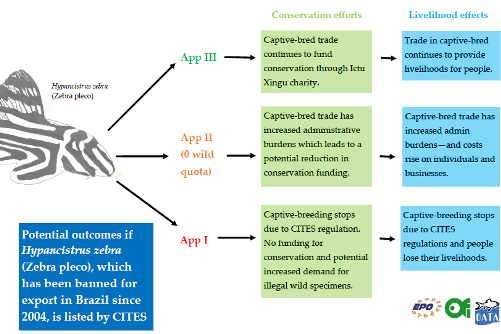
via Ornamental Aquatic Trade Association Ltd (OATA)
OATA has joined fellow global pet trade representatives to make its views heard at the Convention on International Trade in Endangered Species of Wild Fauna and Flora (CITES) Conference of the Parties, taking place in Panama.
On the agenda for the meeting, which looks at ways to ensure the sustainable trade in wildlife, are several items that would affect the global ornamental fish trade, including plans to move Zebra pleco (Hypancistrus zebra) from Appendix III to Appendix I – the highest level of restriction – and to put a number of freshwater stingray (Potamotrygon spp.) onto Appendix II.
A proposal by CITES to examine the trade in marine ornamental fish has still not been fleshed out, although there is still an expectation that a workshop to discuss the conservation of and trade in marine ornamental fishes will be held, but no concrete plans for this have yet been published.
OATA has joined with the European Pet Organization (EPO) and Ornamental Fish International (OFI) to put forward its position on matters relating to ornamental fish:
The proposal by Brazil to move Zebra Pleco (Hypancistrus zebra) from Appendix III to Appendix I: OATA does not support this because there is a lack of evidence that it is needed, a position supported by the international UN Fisheries and Agriculture Organisation (FAO) following considerations by an expert panel of fisheries experts. Wild-caught plecos are already banned by Brazil with legal trade currently only in captive-reared fish. Captive breeding adequately meets demand for plecos in the trade and also funds conservation of wild populations in Brazil. The evidence does not show there have been population declines in wild-caught plecos.
The proposal by Brazil to put a number of freshwater stingrays onto Appendix II: OATA does not support this, as trade is mostly in captive-reared fish rather than wild-caught. Given the lack of clear evidence of population declines, OATA would support more research into gathering better population data before any decision is made for listing.
“CITES is about managing the sustainable trade in wildlife and its decisions should be based on robust data. It is clear these proposals do not have enough evidence behind them and that is also the position taken by the expert panel of the United Nations Food & Agriculture Organization (FAO), a well-respected independent Intergovernmental Organisation,” said OATA Chief Executive Dominic Whitmee.
“We also remain concerned about the progress of the marine ornamental fish proposal. Our aim is always to ensure decisions are made on the best data and science for the benefit of people and the planet and we will continue to press for clarity and transparency about how this project will progress. We, along with OFI, will continue to offer our support to all that is planned for this proposal because it could have very far-reaching consequences for our industry.”
Find out more about the CITES Conference of the Parties which is happening in Panama between November 14 – 21. https://cites.org/eng/cop/19/agenda-documents
###





